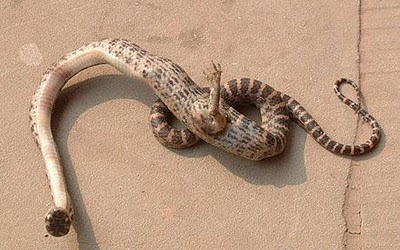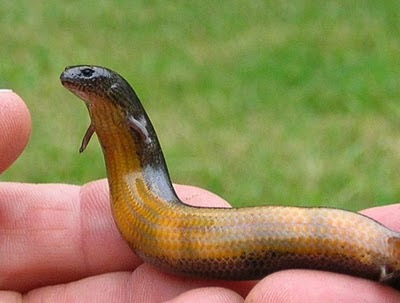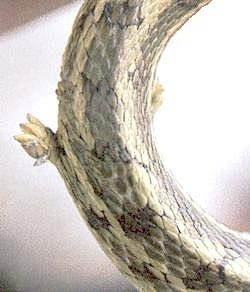A snake with a single clawed foot has been discovered in China, according to reports.
 Dean Qiongxiu, 66, said she discovered the reptile clinging to the wall of her bedroom with its talons in the middle of the night.
Dean Qiongxiu, 66, said she discovered the reptile clinging to the wall of her bedroom with its talons in the middle of the night.
 "I woke up and heard a strange scratching sound. I turned on the light and saw this monster working its way along the wall using his claw," said Mrs Duan of Suining, southwest China.
"I woke up and heard a strange scratching sound. I turned on the light and saw this monster working its way along the wall using his claw," said Mrs Duan of Suining, southwest China.
Mrs Duan said she was so scared she grabbed a shoe and beat the snake to death before preserving its body in a bottle of alcohol.
 The snake – 16 inches long and the thickness of a little finger – is now being studied at the Life Sciences Department at China's West Normal University in Nanchang.
The snake – 16 inches long and the thickness of a little finger – is now being studied at the Life Sciences Department at China's West Normal University in Nanchang.
Snake expert Long Shuai said: "It is truly shocking but we won't know the cause until we've conducted an autopsy."
A more common mutation among snakes is the growth of a second head, which occurs in a similar way to the formation of Siamese twins in humans.
 Such animals are often caught and preserved as lucky tokens but have very little chance of surviving in the wild anyway, especially as the heads have a tendency to attack each other.
Such animals are often caught and preserved as lucky tokens but have very little chance of surviving in the wild anyway, especially as the heads have a tendency to attack each other.

Source
 Dean Qiongxiu, 66, said she discovered the reptile clinging to the wall of her bedroom with its talons in the middle of the night.
Dean Qiongxiu, 66, said she discovered the reptile clinging to the wall of her bedroom with its talons in the middle of the night. "I woke up and heard a strange scratching sound. I turned on the light and saw this monster working its way along the wall using his claw," said Mrs Duan of Suining, southwest China.
"I woke up and heard a strange scratching sound. I turned on the light and saw this monster working its way along the wall using his claw," said Mrs Duan of Suining, southwest China.Mrs Duan said she was so scared she grabbed a shoe and beat the snake to death before preserving its body in a bottle of alcohol.
 The snake – 16 inches long and the thickness of a little finger – is now being studied at the Life Sciences Department at China's West Normal University in Nanchang.
The snake – 16 inches long and the thickness of a little finger – is now being studied at the Life Sciences Department at China's West Normal University in Nanchang.Snake expert Long Shuai said: "It is truly shocking but we won't know the cause until we've conducted an autopsy."
A more common mutation among snakes is the growth of a second head, which occurs in a similar way to the formation of Siamese twins in humans.
 Such animals are often caught and preserved as lucky tokens but have very little chance of surviving in the wild anyway, especially as the heads have a tendency to attack each other.
Such animals are often caught and preserved as lucky tokens but have very little chance of surviving in the wild anyway, especially as the heads have a tendency to attack each other.
Source